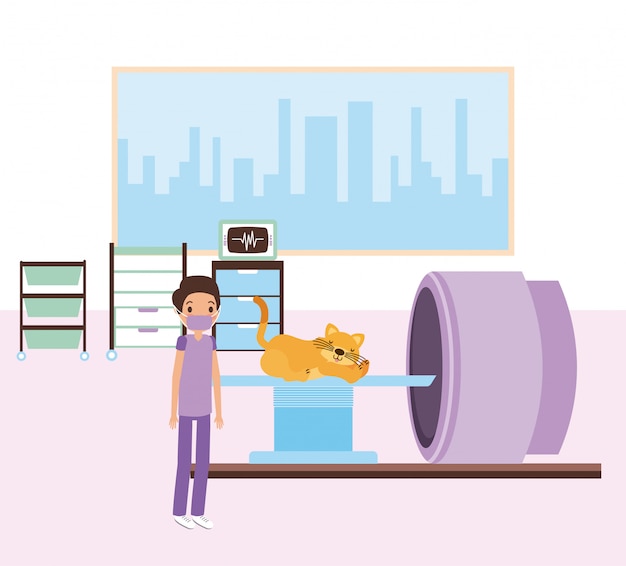When to Seek Advanced Imaging for Unexplained Pet Symptoms

When to Seek Advanced Imaging for Unexplained Pet Symptoms
When your pet starts showing unusual signs—whether it's persistent limping, unexplained weight loss, or ongoing digestive trouble—it can be worrisome and confusing. Sometimes, a routine examination does not reveal the full picture, and more advanced diagnostics are needed to pinpoint the underlying issue. At 4 Paws Imaging, located at 2581 Ogden Avenue, Downers Grove, IL 60515, our experienced veterinary imaging team uses state-of-the-art technology to help local veterinarians diagnose even the most elusive health concerns in pets.
This guide will help you understand when pets need imaging, what unexplained pet symptoms may require advanced diagnostics, and how specialized imaging can support your pet's health journey. Whether you are searching for a "specialist vet near me" or seeking veterinary diagnostics in Downers Grove and surrounding communities, knowing when to ask about advanced imaging can make a significant difference in your pet's outcome. We will also discuss the role of X-rays, ultrasounds, and CT scans in diagnosing tough cases and how our team at 4 Paws Imaging partners with your primary care veterinarian for the best possible care. If you are interested in a comprehensive look at the types of imaging available, you can explore our overview of veterinary imaging services.
Recognizing When Pets Need Imaging: Signs and Symptoms That Warrant Advanced Diagnostics
Pets often hide discomfort or illness, making it challenging to discern when a problem is serious enough to require advanced imaging. However, certain unexplained pet symptoms are more likely to warrant further investigation.
Subtle and Concerning Signs in Pets
Some of the most common reasons veterinarians refer pets for advanced imaging include persistent lameness that is not improving with rest or medication, episodes of unexplained collapse or fainting, chronic vomiting or diarrhea that does not respond to standard treatment, and ongoing coughing or difficulty breathing. Other symptoms that may prompt your veterinarian to recommend imaging are unexplained weight loss, abdominal distension, sudden changes in appetite, or behavioral changes such as increased lethargy or restlessness.
For example, a cat that has suddenly stopped eating and is hiding more than usual may be experiencing abdominal pain due to an internal issue; a non-invasive imaging study like an abdominal ultrasound can help visualize internal organs and identify the cause. Similarly, a dog with a persistent cough or episodes of labored breathing may benefit from advanced imaging to assess the heart and lungs. In some cases, an echocardiogram is necessary to evaluate cardiac function and structure.
When General Exams Aren't Enough
Your primary care veterinarian may recommend advanced imaging if physical exams and standard laboratory tests fail to identify the cause of your pet's symptoms. This is especially true when the signs are chronic, worsening, or involve multiple body systems. Veterinary diagnostics in Downers Grove are designed to complement your veterinarian's expertise, offering a deeper look when answers are hard to find.
Why Do Unexplained Pet Symptoms Occur? Understanding the Need for Advanced Imaging
Unexplained pet symptoms can be caused by a wide range of underlying conditions, from subtle organ dysfunction to hidden injuries or masses. Many illnesses start with mild or ambiguous signs, making them difficult to diagnose without specialized equipment.
Complexities Behind the Symptoms
For instance, chronic vomiting in a middle-aged cat might be due to inflammatory bowel disease, a foreign object, or even an abdominal tumor. Each of these conditions requires a different treatment approach, but they can be difficult to distinguish through routine exams alone. Advanced imaging, such as a targeted abdominal ultrasound, can help differentiate between these possibilities by providing detailed images of the gastrointestinal tract, liver, spleen, and other abdominal organs.
Similarly, dogs with intermittent episodes of weakness or collapse may be experiencing underlying heart disease or arrhythmias. In these cases, imaging modalities like echocardiography or electrocardiogram studies are essential for a definitive diagnosis. If your veterinarian suspects thyroid dysfunction due to symptoms such as weight changes, increased thirst, or behavioral changes, a thyroid ultrasound may be recommended for a thorough evaluation.
The Role of Imaging in Pinpointing Causes
Diagnostic imaging is invaluable in identifying issues that are invisible to the naked eye or palpation. For pets in Downers Grove and surrounding areas, advanced imaging is often the next step when initial treatments do not resolve the problem or when a more serious condition is suspected. If you are searching for "pet diagnostics near me" because your pet's symptoms remain unexplained, advanced imaging can provide the clarity needed for targeted, effective treatment.
How Advanced Imaging Helps: Treatment and What to Expect
When your veterinarian refers your pet to a specialty imaging facility like 4 Paws Imaging, it is because your pet will benefit from a higher level of diagnostic insight. Our team specializes in a range of non-invasive and minimally invasive imaging techniques that help guide treatment decisions for complex or unresolved cases.
The Imaging Process and Available Modalities
Depending on your pet's symptoms, your veterinarian may recommend X-rays to assess bones, lungs, or the abdominal cavity. X-rays are especially useful for detecting fractures, foreign bodies, or certain types of tumors. For a more detailed look at soft tissues and organs, ultrasound imaging provides real-time visualization, which is essential for diagnosing abdominal and cardiac conditions. An abdominal ultrasound is frequently used to evaluate the liver, kidneys, spleen, bladder, and intestines, especially when pets have ongoing digestive issues or unexplained pain.
For heart-related symptoms such as coughing, fainting, or exercise intolerance, an echocardiogram and electrocardiogram can provide detailed information on heart structure, function, and rhythm. In some cases, advanced imaging like CT scans may be needed to evaluate complex internal problems, such as neurological issues or intricate soft tissue injuries. These procedures are performed in a controlled, low-stress environment, and our veterinary professionals work closely with your primary care veterinarian to interpret results and develop a personalized treatment plan.
What Pet Owners Can Expect
Most imaging studies are non-invasive and do not require significant preparation, though some pets may need mild sedation to remain calm and still during the procedure. Our team will explain every step and answer your questions before, during, and after the imaging session. Once imaging is complete, results are shared promptly with your primary care veterinarian, who will discuss the findings and next steps with you. This collaborative approach ensures your pet receives the most accurate diagnosis and the best possible care plan.
Supporting Your Pet at Home: Prevention and Monitoring
While advanced imaging is essential for diagnosing unexplained pet symptoms, ongoing monitoring and proactive care at home play a crucial role in your pet's long-term health. Pet owners can help by observing their pets closely for subtle changes in behavior, appetite, or activity levels and keeping a written record of concerning symptoms.
If your pet has been diagnosed with a chronic condition, regular follow-up with your primary veterinarian and timely reporting of new or worsening symptoms are important. For some pets, especially those with ongoing health risks, periodic imaging studies may be recommended to monitor disease progression or response to treatment. Veterinary diagnostics in Downers Grove are designed to support these ongoing care plans, ensuring your pet's health is always closely monitored.
You can also reduce the risk of certain health problems by maintaining a healthy diet and weight for your pet, providing regular exercise, and scheduling routine wellness exams with your veterinarian. Although not all conditions can be prevented, early detection and intervention are key to successful outcomes.
When to Seek Veterinary Imaging: Knowing the Right Time to Act
Deciding when to pursue advanced imaging can feel overwhelming, especially when your pet's symptoms are ambiguous or intermittently present. The most important guideline is to trust your instincts as a pet owner—if your pet's condition is not improving or you have concerns about persistent, unexplained symptoms, discussing advanced imaging with your veterinarian is always appropriate.
Working with Your Veterinarian and Imaging Specialists
Advanced imaging is usually performed upon referral from your primary care veterinarian, who will determine if it is needed based on your pet's history, physical examination, and initial test results. If your veterinarian recommends specialized imaging, choosing a trusted facility like 4 Paws Imaging ensures your pet receives the highest standard of care.
If you find yourself searching for a "specialist vet near me" because your pet's symptoms remain unresolved, know that advanced imaging is a powerful tool that can provide much-needed answers. Prompt imaging is especially important when symptoms are severe, rapidly worsening, or suggest the possibility of a life-threatening issue, such as sudden collapse, severe pain, or respiratory distress.
If you are in Downers Grove or nearby and need pet diagnostics near me, our veterinary imaging professionals are here to support you and your primary care veterinarian with state-of-the-art diagnostic solutions.
Take the Next Step: Partnering with 4 Paws Imaging for Your Pet's Health
Unexplained pet symptoms can be distressing, but you do not have to navigate them alone. Advanced imaging often provides the answers needed to move forward with effective care, whether your pet is struggling with abdominal discomfort, heart-related concerns, or other challenging health problems. At 4 Paws Imaging, our goal is to deliver high-quality imaging services in Downers Grove and surrounding communities, supporting both pet owners and referring veterinarians every step of the way.
If your veterinarian has recommended diagnostic imaging or if you are searching for a "specialist veterinarian near me" due to persistent, unexplained symptoms, our team of veterinary professionals is ready to assist. We offer a full suite of imaging services, including abdominal ultrasounds, echocardiograms, thyroid ultrasounds, and more. For a complete overview of our capabilities, visit our veterinary imaging services page.
You can reach us at (630) 746-1382 or visit us at 2581 Ogden Avenue, Downers Grove, IL 60515. Your primary veterinarian can submit a referral, or you can call with questions about our advanced imaging options. If you have been searching for pet diagnostics near me or want to ensure your pet receives the most comprehensive veterinary diagnostics in Downers Grove, we are here to help you get the answers your pet deserves.
Disclaimer: This blog is intended for educational purposes only and does not replace professional veterinary advice. Always consult your veterinarian for concerns about your pet's health or before pursuing advanced diagnostics.
















